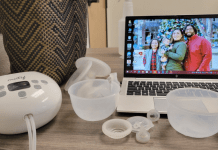When I first heard of out of hospital births, I didn’t believe it was something that happened, especially not in El Paso. After diving in and learning everything I could about out of hospital birth, I ended up giving birth to my son at home. This decision shocked a lot of people. I heard it all. How could a nurse have a home birth? I wanted to share some facts about out of hospital birth attended by midwives.
 1. Midwives Are Trained Professionals
1. Midwives Are Trained Professionals
One of the most common questions I would get asked when I was planning my home birth was how prepared the midwives are. Most of us trust obstetricians because they are medical doctors. But midwives are not laypeople. They are highly trained professionals and well versed in providing perinatal care as well as care during labor and delivery.
The midwifery model of care differs from the obstetric/medical model in that it views pregnancy as a natural physiological occurrence instead of a medical condition. Midwifery care often takes a more holistic approach and advocates for informed decision-making.
As with any medical provider ,I recommend you interview various midwives, ask about their training, and make a decision based on what is important to you.
2. Emergency Preparedness
One of the most hurtful statements someone made to me was, “After having two miscarriages, I cannot believe you are willing to risk the safety of your child.” I did not make the decision to have a home birth on a whim. One of the biggest concerns we had was the safety plan that would be in place in case of an emergency. Birth is a complex process and emergencies can arise.
Midwives are prepared for emergencies. They carry oxygen (for both mom and baby), medication to stop excessive bleeding, are trained in adult and neonatal resuscitation, etc. My midwife also made it clear that she was trained to see yellow flags. This means if she felt uncomfortable with something during labor, she would have us transfer to a hospital prior to it becoming an emergency (before it became a red flag).
3. Postpartum Care for Mom and Baby
Midwives also provide care in the immediate postpartum period. They can do stitching if necessary as well. They stay for a few hours postpartum and ensure that mom and baby are doing well.
One of the concerns my husband had was for the immediate care of baby after birth. Midwives are able to measure your baby, give them vaccinations, and register their birth certificate.
4. A Home Birth Is Not for Everyone
Out of hospital birth is reserved for low-risk pregnancies. As with most things in motherhood, this decision needs to be made based on your comfort level and your personal risk to benefit assessment. With that said, we should all respect each other’s decisions whether we birthed in a hospital or not. There is no need to cause more divisiveness in motherhood.
I hope that was a helpful list and that you learned something new about out of hospital birth. It’s great to know that home birth is an option. A lot more people in El Paso choose this route than you’d expect. Everyone’s birth experience is unique. Share your story with us!
Originally published April 2022.
The opinions expressed in this post are those of the author. They do not necessarily reflect the official policy or position of El Paso Mom, its executive team, other contributors to the site, its sponsors or partners, or any organizations the aforementioned might be affiliated with.









